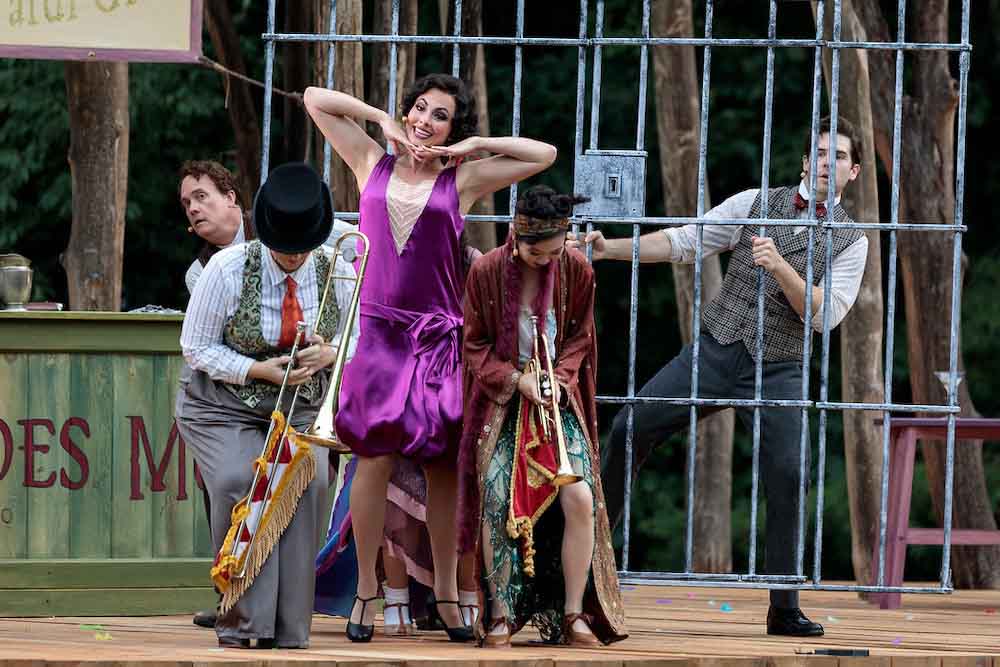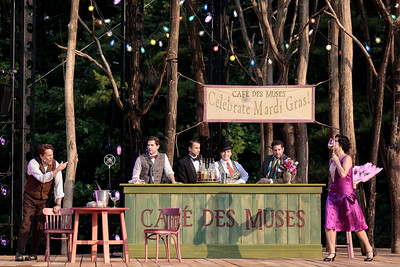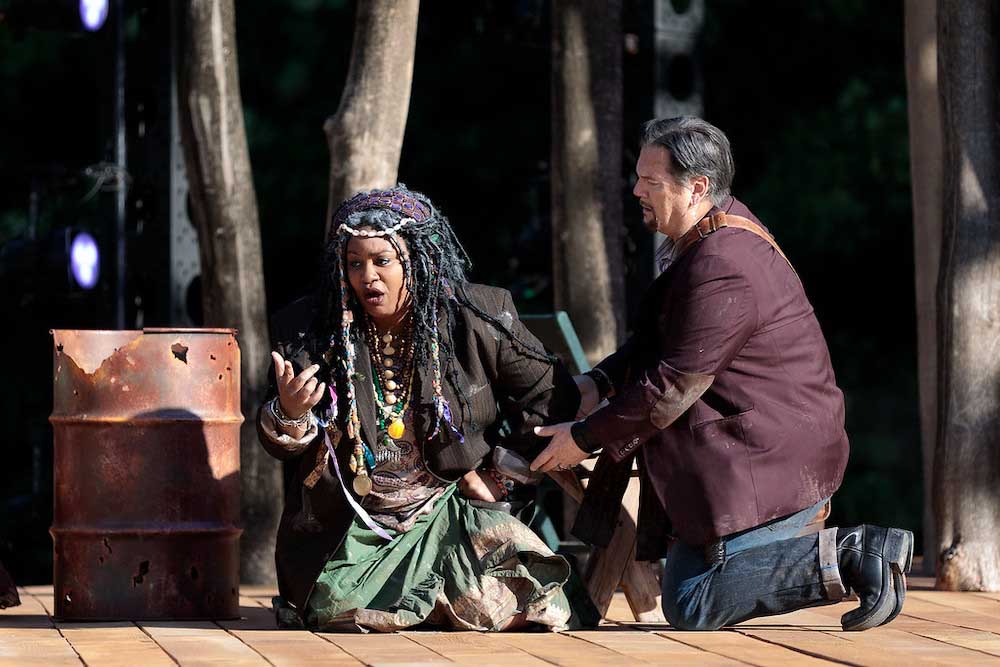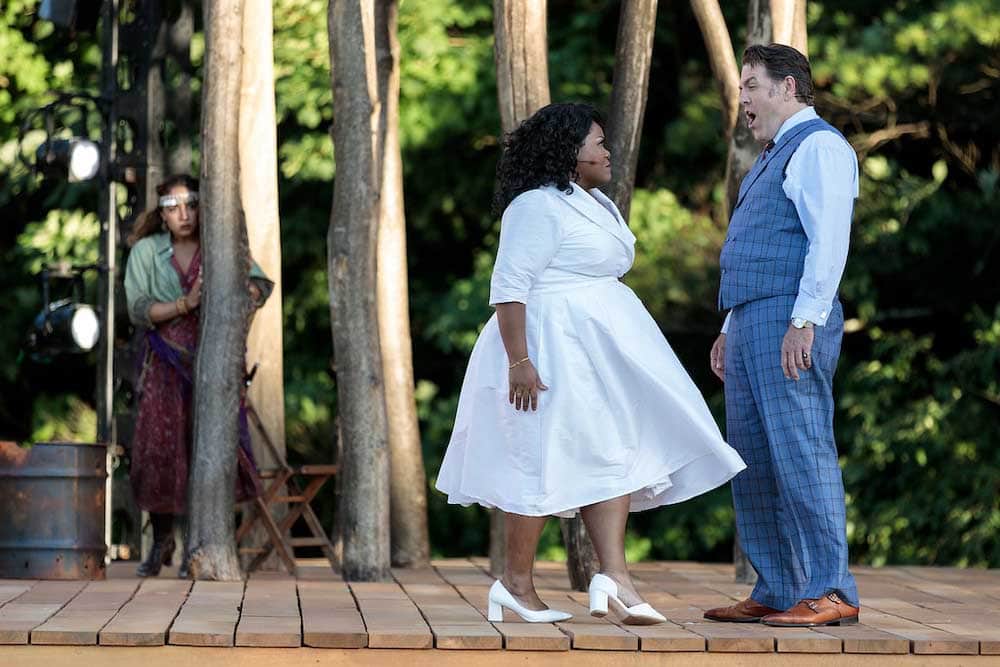The sun was hot; the lawn chairs were low. The COVID compliance masks were visible, but printed programs were unavailable — kinder certainly to the environment. The Festival has been in operation since 1975 but this, in its 46th year, had to be reimagined as Glimmerglass on the Grass, and it became a whole new “impossible dream” adventure.
The attention to detail that had to happen to pull this season off is staggering. On the back end of the 2021 Olympics, which of course has had its own special challenges and drama, it’s hard not to compare some of the issues. Artistic Francesca Zambello and her American team should be given highest marks going into it for degree of difficulty.

The outdoor lawn stage, donated by Andrew J. Martin-Weber, with its metal proscenium cage framed the stage admirably but also, as was discovered on the evening of a scheduled performance, was a lightning rod in storms. Zambello’s company may be the only one in the country to hire a meteorologist, and he had the power, as we would learn, to turn off the power and shut down a show. The union orchestra would not be able to perform outside above a certain temperature, so musicians were playing in the (one assumes ventilated) opera house while the singers performed rain or shine outdoors the equivalent of a soccer field away. Monitors showing the conductor were in place to guide the singers, but I wondered if the glare of the sun even allowed them to see. Most challenging for all concerned, the temperatures rose unseasonably high, slowly roasting singers and audience alike. Thus the field on the audience side became a landscape of parasols and fans, while the poor costumed singers had to be doused with water bottles and slapped with ice-packs as they exited the stage between scenes.
One of the great wizards of the proceedings was Sound Designer Andrew Harper along with his team. For those readers less than avid opera goers, you may need to be reminded that, generally speaking, the world of opera prides itself on being an acoustic art form, and a prerequisite for an opera singer to gain prominence is that he/she/they must be endowed with a huge voice able to carry, hit the back wall of a large auditorium, and sing over an orchestra. Impossible in this vast multidirectional space; the lack of enclosure ate up sound and energy. But the sound system was so sophisticated it could provide just a little added presence to each unique voice without flattening the overtones (opera lovers’ “to-die-fors”) or muddying directionality.
The same kind of care to keep audience and artists distanced and safe had gone into the programming. Well aware of budget constraints and other variables, not to mention the post-COVID shrunken attention spans of arts consumers, where even opera lovers might not endure hours of classic repertoire in the sun, everything had been pared down as close as possible to 90 minutes. Opera fare not only had to be short-lived but lively and highly entertaining.
Songbird
The creative team got it just about perfect for Songbird, an adaptation of Jacques Offenbach’s La Perichole by Eric Sean Fogel collaborating with James Lowe, who provided new musical arrangements and orchestration, and company favorite Kelly Rourke, who has consistently done double even triple duty as Dramaturg, Surtitlist (making user-friendly witty translations of foreign operas), and Librettist as needed — like a cordon bleu chef whisking a lighter-than-air soufflé. The team transported the original opera to New Orleans with people setting up a speakeasy to celebrate Mardi Gras.

Lowe’s orchestrations were sparkling and positively feet-tapping, transforming Offenbach melodies with New Orleans–style jazz instrumentation. Lowe also conducts — and, as I mentioned, in the current set up from the auditorium out of sight and yards away from the stage. Nonetheless, from the opening number, the joint started jumping, and it never stopped.
Zambello shared stage direction of Songbird with the highly talented choreographer-director Eric Sean Fogel. Every number seemed chock-full of dance steps from the 1920s. The bodies, even a bit herky-jerky at times, called to mind chases and the bouncy, upbeat tempi of silent film action. The ensemble, though small in number, made it all seem to go down like a favorite cocktail. Laissez le bon temps roule!

Isabel Leonard sang the title role as a struggling vaudevillian with tenor William Burden as her stage and life partner Piquillo. Throughout the opera, both treated the audience on stage and off to lovely arias and duets, including songs in alternating lines rhyming in French with English and English with French. (Ah, that clever Rourke.)
The plot hangs on the setup where Songbird is too hungry not to run off with the first man who can feed her, who happens to be the devilishly minded mayor (Michael Pandolfo). He wants to marry her off in a sham Mardi Gras wedding so he can enjoy her favors at the Mayor’s mansion undetected (a shameless #metoo frisson), where the bride is too tipsy to know at first whom she is being forced to marry and Piquillo too down in the dumps to notice or care.
It’s all lubricated with more boozing, singing, and dancing by the wonderful small ensemble. There’s a fun male trio in the middle of the piece, translated from the original as “Life without a women is a mess!” performed by Kameron Lopreore and Peter Morgan with Pandolfo. The women (Helen Zhibing Huang, Ariana Warren, Maire Therese Carmack, and Emily Misch) give back as good as they get with “What we have done hasn’t got us merde!” And we get treated to a Mardi Gras float, complete with the good mayor as Rex and something of a traditional steppin’ band materializing on stage before love conquers all — as it must.
At a breezy 75 minutes, the piece was a lark, executed with joie de vivre, and certainly the recommended antidote to the COVID blahs. Vive l’opèra!
Il Trovatore
Il Trovatore was served second in the Glimmerglass lineup of this weekend. The Giuseppe Verdi work is a staple in the opera canon, and, originally a hefty four acts, was given quite the trim and a shave.
General Manager Francesca Zambello and Music Director and Conductor Joseph Colaneri are fearless artists and can pretty much pull anything off together and here are joined by Eric Sean Fogel, sharing stage direction with Zambello. Once again the team has uncannily intuited a theatrical way into a classic to grab today’s audience by speaking to today’s headlines and these still “difficult times.” First, they excised the four-act opera to just over an hour and a half without an intermission. The creative team also shifted the focus onto the gypsy Azucena.

The character frames the whole story, bringing in the theme of global refugees, where “gypsy” and “witch” clearly stand in for the alien “other.” Near the top of the show we see a group of this shabby diaspora wandering amidst the barren skeletons of trees, perhaps following an apocalyptic fire, with a dazed Azucena downstage, clutching a blanket as if around an infant but one who disappears again and again into air as the blanket slips. Following the famous Anvil Chorus, we hear Azucena’s almost incantatory first aria.
The opera proceeds as tales of memory told from different perspectives about a certain horrific event — like a series of nesting dolls. But in this production it’s Azucena’s story.
Raehann Bryce-Davis sings with the energy of one possessed — or one reliving deepest trauma. In one moment it is as if she is lifted out of her body and sways suspended on a glistening high note then swoops down to a note, no an emotion, somewhere between her womb and six feet under. She relates how she saw her mother dragged then burned at the stake and how she still wants the opportunity to avenge her death. Later, she also confesses to Manrico, the man she has raised as her son, whom as a babe she had abducted from Di Luna’s house, thinking to kill the child, but had “adopted” him after being so distraught she had thrown her own child into the blaze instead.
God, how this mezzo-soprano exists in her body! If she were an Olympic gymnast you might say she sticks every landing — pulling energy from the earth up through her legs the way I wish so many other opera singers would do. Yet she exhibits total control of her sound. Her deep rich tones are endlessly listenable, her release of vibrato on a high note exquisite. Her performance deserved a gold medal.
It can be tough to pull off the heroic, highly choreographed grand style of this kind of Verdi opera. Bryce-Davis synthesizes style and emotion. Her commanding presence and hieratic gestures make us understand that her character is from a different, older world order and tribe.
Gregory Kunde as Manrico is at his best in the scenes with this mother figure shaping the pathos in his voice with his emotional conflict to do the right thing by her and avenge her mother’s murder. In their duet they create a most believable mother and son relationship.
Michael Mayes as Count di Luna who appears in a sharp blue suit and dark sunglasses seemed perfectly cast as the powerbroker count, or perhaps a dictator of a small country, which he runs like a mafia boss. He models well the upright, puffed-up posture of men with short fingers and big narcissistic egos. There was more than a nod to testosterone-filled, entitled leaders used to getting their own way with young powerless woman and not above forcing them against their will.

Mayes carries us along through his thought processes, shifting as he plots and careening from one mood to another. There is an intelligent animal instinct in Mayes’s approach to roles, also an underlying danger, but di Luna’s carriage indicates he is always seemingly aware he is before a public.
The somewhat static ritualized placement of characters on the outdoor stage worked to variable satisfaction with the other characters. Peter Morgan did well as Ferrando representing a stiff military commander of the ruling class, and his retelling of the hunting down of the gypsy witch showed appropriately all the compassion of a snake. The chorus of guards, reduced out of necessity to a musical quartet, were dressed like Mussolini’s fascist blackshirts, stationed against the bare trees and staring into the foreground alert and tense. Their minimal staging and strong focus were convincing, and their voices blended admirably. Similarly, there was a lovely simplicity in the staging of three nuns played by Lisa Marie Rogali, Mary-Hollis Hundley, and Stephanie Sanchez, in the convent. There was just enough provided as context for us to understand how these cloistered women, whose lives were so circumscribed and choreographed, would be stifling to one like Leonora, who was just opening to love and a world of choices and emotional fullness.
The disappointment for me was the Leonora. Latonia Moore is an in-demand soprano, and her Leonora was a much-anticipated event. But there seemed a film over her voice at the start of the performance. The voice became more focused in the second half of the opera. But there was a lack of both emotional and physical commitment, all the more noticeable for Leonora being costumed in an unflattering, too-short something resembling a little girl’s confirmation dress. It brought to mind the Olympics and how we were shown that even medalist favorites have tough days where the coordination of mind and body just isn’t there. How true of these opera singers, battling heat and so much else to stay on their instruments.
The show ran just over 90 minutes.
To be continued with Part Two of Glimmerglass on the Grass. The Festival this year runs through August 17, 2021. For next year’s season, go to Glimmerglass.org. Book early to avoid disappointment.




